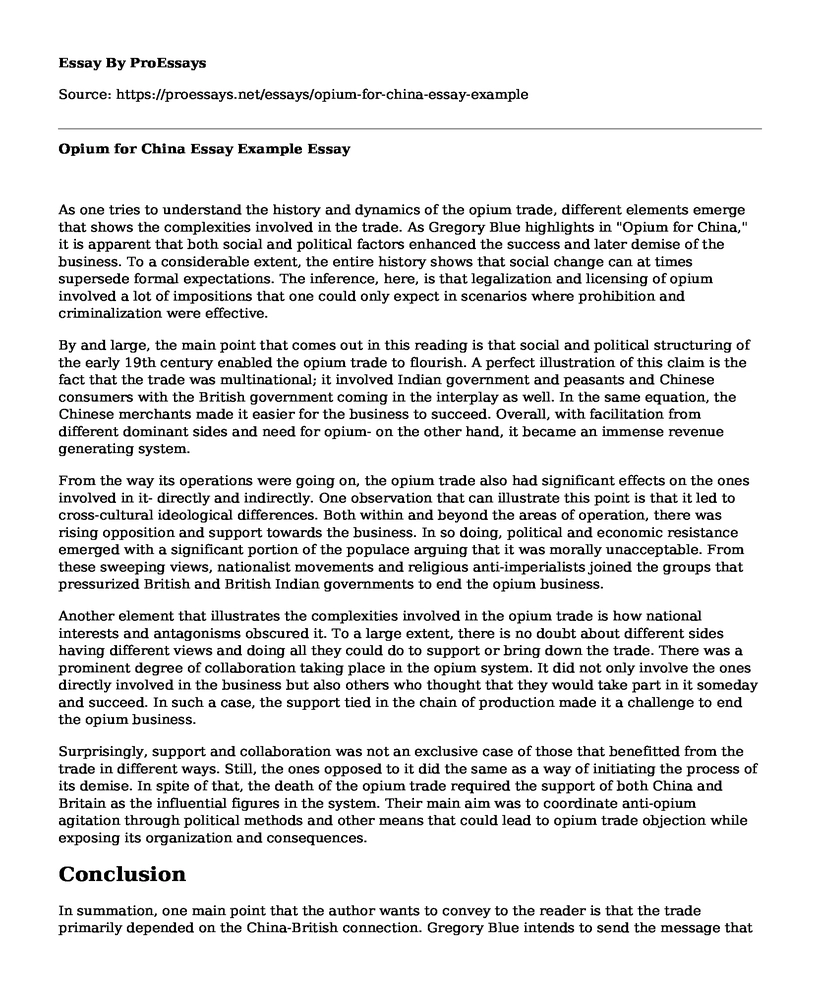As one tries to understand the history and dynamics of the opium trade, different elements emerge that shows the complexities involved in the trade. As Gregory Blue highlights in "Opium for China," it is apparent that both social and political factors enhanced the success and later demise of the business. To a considerable extent, the entire history shows that social change can at times supersede formal expectations. The inference, here, is that legalization and licensing of opium involved a lot of impositions that one could only expect in scenarios where prohibition and criminalization were effective.
By and large, the main point that comes out in this reading is that social and political structuring of the early 19th century enabled the opium trade to flourish. A perfect illustration of this claim is the fact that the trade was multinational; it involved Indian government and peasants and Chinese consumers with the British government coming in the interplay as well. In the same equation, the Chinese merchants made it easier for the business to succeed. Overall, with facilitation from different dominant sides and need for opium- on the other hand, it became an immense revenue generating system.
From the way its operations were going on, the opium trade also had significant effects on the ones involved in it- directly and indirectly. One observation that can illustrate this point is that it led to cross-cultural ideological differences. Both within and beyond the areas of operation, there was rising opposition and support towards the business. In so doing, political and economic resistance emerged with a significant portion of the populace arguing that it was morally unacceptable. From these sweeping views, nationalist movements and religious anti-imperialists joined the groups that pressurized British and British Indian governments to end the opium business.
Another element that illustrates the complexities involved in the opium trade is how national interests and antagonisms obscured it. To a large extent, there is no doubt about different sides having different views and doing all they could do to support or bring down the trade. There was a prominent degree of collaboration taking place in the opium system. It did not only involve the ones directly involved in the business but also others who thought that they would take part in it someday and succeed. In such a case, the support tied in the chain of production made it a challenge to end the opium business.
Surprisingly, support and collaboration was not an exclusive case of those that benefitted from the trade in different ways. Still, the ones opposed to it did the same as a way of initiating the process of its demise. In spite of that, the death of the opium trade required the support of both China and Britain as the influential figures in the system. Their main aim was to coordinate anti-opium agitation through political methods and other means that could lead to opium trade objection while exposing its organization and consequences.
Conclusion
In summation, one main point that the author wants to convey to the reader is that the trade primarily depended on the China-British connection. Gregory Blue intends to send the message that with prolonged China-British link, the opium business could have gone for long. The only question that one would want to ask the author is at what point the relationship became loose such that the two parties ended collaborating. Overall, the argument is easy to follow and clear.
Cite this page
Opium for China Essay Example. (2022, Nov 20). Retrieved from https://proessays.net/essays/opium-for-china-essay-example
If you are the original author of this essay and no longer wish to have it published on the ProEssays website, please click below to request its removal:
- The September 11 Attacks - Research Paper
- Essay Sample on Woman in Ancient Society
- Out of This Furnace: the US Economy in the Period Between 1880 to 1920 Essay
- Essay Example on African American Literature: Then vs Now
- Essay Example on American Business Culture: An Inclusive Land of Opportunity
- Uniting Canada: Defining Nations Before and After Treaty Signing - Essay Sample
- Post Civil War Life - Essay Example







